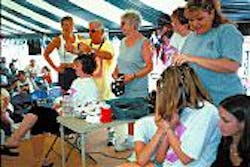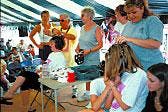Will periodontists ever be satisfied?
Dear RDH:
We read with concern the letter to the Readers' Forum from Dr. Bueltmann of the American Academy of Periodontology. It seems laser clinicians will never be free from the incessant AAP criticism of lasers that we have been subjected to over the last 12 years, as well as their refusal to accept the fact the FDA has approved lasers for use in adjunctive periodontal therapy (including laser sulcular debridement, laser periodontal therapy, and laser curettage). Dr. Bueltmann's letter with respect to the FDA's Warning Letter regarding Laser ENAP made false statements about the facts and was unfortunately very misleading and a great disservice to the profession.
Laser ENAP is a patented form of laser periodontal therapy which has been well published, documented, and researched, and is based on sound principles of periodontal wound healing. It is not accurate to imply that laser ENAP is an equivalent technique to scalpel ENAP. Laser ENAP was merely patterned after the principles of scalpel ENAP.
The fact that the AAP and its leadership refuse to take a considered review of the published clinical case studies and peer reviewed literature speaks volumes about their agenda in opposing a technology they are unfamiliar and awkward with. One reason we patented the procedure is to prevent the sort of mischief in laser research that some investigators have been and still are tempted to indulge in.
Everyone, and especially periodontists, needs to understand that lasers are not scalpels, or replacements for scalpels or curettes. They have sophisticated and very different interactions with target tissue than cold steel. Lasers can ablate (vaporize) some tissue and ignore other tissues altogether. This is a good thing. Kill the pathogens and leave the healthy (or that with potential to be healthy) alone! This was the point that Dr. Martha Cortes was trying to make.
No procedure that periodontists submit their patients to now (for example osseous surgery) has been studied to the extent that our critics insist and demand for Laser ENAP or any laser periodontal procedure for that matter. The FDA understands and recognizes that clinical case results of "new" technologies are important criteria to consider, and can be as good and important consideration of patient safety and efficacy as basic science research. The document titled Statistical Guidance for Clinical Trials of Non-Diagnostic Medical Devices found on the FDA web site: http://www.fda.gov/cdrh/manual/statgde.html states under Section II. Valid Scientific Evidence, paragraph 2, "Valid scientific evidence is evidence from ellipse well-documented case histories conducted by qualified experts, and reports of significant human experience with a marketed device, from which it can fairly and responsibly be concluded by qualified experts that there is a reasonable assurance of safety and effectiveness of a device under its conditions of use."
Over the last 12 years, laser dentistry has reached one milestone after another, and the standards and milestones are raised yet again by the periodontists, and sometimes the argument is over questions we have already answered scientifically in the past (pulp damage, for example), or the critic doesn't like the answer (histology on 55 teeth with a pulsed Nd:YAG showed no nerve damage at 6 weeks - Harris et al).
Recent investigations regarding Laser ENAP include: a retrospective studies of over 1,900 probing sites in 3 private practices, a controlled, prospective histology study at a major university with results to be published upon completion (we are seeing regeneration and new attachment - not long junctional epithelium in two out of three cases). Proof of principle was the aim of the study. We are now planning a multi-centered clinical trial.
But will any study or set of studies that don't reflect negatively on the use of lasers in the periodontal pocket ever be enough to satisfy our periodontal colleagues? We think the past 12 years suggest that some will not ever be satisfied no matter what the study or the result.
Robert H. Gregg, DDS
Co-Director Institute for Advanced Laser Dentistry
Cerritos, California
Harvest or executions?
Dear RDH:
I was extremely pleased with the March 2002 feature story, "A-hunting she will go," about hygienist Julia Egan. It was done very professionally and with a very pleasing lack of editorializing. My hat is off to Cathy Hester Seckman, RDH. Finally, someone recognizes that shooting sports are a very big part of America. With more than 60 million Americans enjoying the sport, it's about time.
As a child growing up, I learned about hunting deer and killing our flock of chickens before I was in school. No doubt RDH reader Julie Kilker from Manhattan Beach, Calif. (May 2002 Readers' Forum) would consider that process "disgusting." Dad had a section of a tree 18 inches high with a two-foot diameter called a chopping block. He used it to chop wood we used for cooking on our wood stove and to heat the house.
The chickens were held by their feet with their head on the chopping block, and an ax would be used to behead each chicken. The chickens then would be tossed to the ground, where I was surprised to see they landed on their feet and ran around until they bled out and collapsed dead. The chicken then was immersed in a huge tub of boiling water for a few seconds to make plucking all of the feathers easier (possible). We did this every year - buying chicks in the spring, feeding them all summer, killing them in the fall, and freezing the chickens for food in the winter. We also had pigs and rabbits, and Dad and Mom would go deer hunting every year in both the bow season and rifle season.
It was how we survived. I looked forward to these events just as I did the fall of the snow, because it meant there would be hearty meals on the table in the coming months. The meat we ate then was far better than anything you can buy in the grocery store today. The hormones, antibiotics, and other chemicals fed to the animals we eat now is alarming. Kilker spoke of the conditions the farm-raised birds grow up in; Julie, you need to visit the farm your beef comes from.
The harvest of the animals my parents took would all be considered "executions" by the well-informed Julie Kilker, who, no doubt, has participated in many hunting events herself; otherwise, how would she know as much as she professes regarding the raising of farm-bred game birds? Or maybe she just parrots the words of some do-gooder liberals bent on saving everything they have determined should be saved.
My suggestion to Julie Kilker is to walk a mile or two in the shoes of those you so abhor before you condemn all 60 million of us. Tomorrow, there will be 70 million; the sport is growing fast, and some of us may even be your closest friends and neighbors. You ready to go hunting, Ms. Kilker?
Gary Schimelfenig, RDH
Wenatchee, Washington
Nebraska's definition
Dear RDH:
I am writing in response to the many letters that appeared in last month's issue. All of these letters were in response to Ms. Schacher. I was shocked to hear what the respondents had to say. Obviously, there are some hard feelings between those who replied and hygienists with bachelor's degrees.
First, let me say this: I agreed with what Ms. Schacher had to say. She was commenting on salaries and jobs. Nowhere did she make a statement about hygienists with "two-year associate degrees."
When someone refers to associate/preceptorship programs, they are talking about the so-called 1-plus-1 programs, which Nebraska is trying to initiate. In these programs, you go one year to become an assistant and continue on to become a hygienist in the following year. These individuals receive associate's degrees with preceptor training - they are or can be trained on-the-job by a doctor.
I think many people misread Schacher's letter and owe her an apology. If they were aware of these programs, they would be worried and telling others not to expect more than you are worth. I was surprised you also sided with the others against her in the argument of two vs. four years, which I will again point out how she mentioned nothing of the two-year program, good or bad. I think every hygienist should agree with Ms. Schacher. I know I do.
Jane Deking, RDH, BS
Omaha, Nebraska
Bitter medicine
Dear RDH:
A dose of your own medicine - bitter, isn't it?
Imagine, if you will, that your new issue of RDH magazine has arrived in the mailbox. With gleeful anticipation, you sit down to take in each page of information with hungry eyes because you, the good hygienist, have a sincere and deep thirst for continuing knowledge in the profession that you love. Imagine, that almost each time your RDH magazine arrives, you find within the pages disparaging remarks that belittle you and the career that you give your heart and soul to each day.
Welcome, associate-degreed hygienists to the world that was once reserved for preceptors only. Based upon the last Readers' Forum, I'd say someone touched your nerve. I mean the audacity of Ms. Schacher to imply that, simply because of degree, a superior, skilled hygienist is made! (I'm sure no one except preceptors will find the connection here and see the point.)
When will the egos ever be deflated? And when can we get back to what all of us - preceptor, associate's degree, bachelor's degree - came to do in this field of hygiene? When will we stop singing the song, "Anythi ng you can do, I can do better?"
Victoria Powell
Scottsboro, Alabama
Preceptor graduate 1995
Am I a good hygienist?
Dear RDH:
I received an associate's degree from Forsyth/ Northeastern University (Boston). I scored in the 90th percentile on my national boards and was a member of the dental hygiene honor society. Was I a good hygienist? Maybe.
I then received a bachelor's degree from Columbia University (New York City) and another state license. Was I a good hygienist? Maybe.
Down the road a few years, I landed in Denver and worked full-time for a superb periodontist. By this time, I had five state licenses. Was I a good hygienist? Maybe.
Now, it's 36 years later, with licenses from Massachusetts, New York, Hawaii, Colorado, and California. I work part-time for a superb periodontist. Am I a good hygienist? Maybe.
It's not the associate's or bachelor's degree, or the years of experience, that count. Excellence comes from within - the constant pursuit of excellence, the need to be better than the day before, to learn something you didn't know before, to work efficiently, communicate lucidly ... that's what it's all about. Neither Forsyth, nor Columbia, nor my great periodontists made me good - by themselves. They all combined their knowledge to enhance my ability to be better. They shared their pursuits of excellence during my personal journey toward excellence.
At the beginning - two years out (like Schacher is), I probably thought I knew everything. Now I know that I know nothing. We each are the sum of the knowledge we share with each other. Degrees open doors. On my resume, the bachelor's degree from Columbia gets me into every door I want. But my heart, mind, and skilled hands keep me there - and those parts I do not take credit for, but thank the people along this journey who have cared enough to make me better than I was the day before.
Each month I seek new knowledge from articles written by people willing to share with me - authors such as Trisha O'Hehir who try to find a way to succinctly translate the latest research in a way that I will understand it and can communicate it to my patients.
We each must raise the bar of excellence. The very first dentist I worked for on Madison Avenue in New York City said to me, "Learn to be the very best you can be. Don't be concerned about the money. It will always come to the best of the best." I'm not the best of the best, but I'm still trying. Am I a good hygienist? Maybe..
Fran Santoro Chuba, RDH, BS
Alamo, California
Bald for a cause
Dear RDH:
On May 10-11, the Pensacola Dental Hygiene Association participated in the Relay for Life - an 18-hour event to raise money for the American Cancer Society. Walkers and joggers representing more than 100 teams from the community had a team member on the track for the entire 18 hours. The weekend was filled with activities having a good balance of entertainment, food and frivolity, and a dignified and respectful celebration of life and triumph over disease. Luminaries circled the track throughout the night as a tribute to honor or memorialize individuals stricken with cancer.
This was the ninth year that the Pensacola Dental Hygiene Association participated. This year, Telka Jackson had a bold idea - for every $5,000 raised by the dental hygiene team, one member would shave her head. "Bald for a Cause" was born.
Five team members agreed to do this. They were Telka Jackson, Lynn Hart, and Vicky Barnett - who are all employed in private practice - Linda Lambert, a dental hygiene professor, and Helen Douglas, a Florida Board of Dentistry member. The five appeared on a local television program and the Pensacola News Journal did a feature on the team members.
Not only did the team raise $10,395.19 for cancer, they raised awareness for the profession of dental hygiene. On May 11 at the Relay for Life campground, Telka Jackson and Lynn Hart became bald for a cause. Their locks were donated to "Locks for Love," an organization that makes wigs for cancer patients.
Helen Douglas, RDH
Pensacola, Florida
null
Before-and-after photographs of Telka Jackson and Lynn Hart getting clipped.
Correction
In the April 2002 issue, the URL for the Dental Friends bulletin board was incorrectly printed. The correct address for Dental Friends is http://www.den talfriends.net. We regret the error.
Clarification
In the May 2002 issue of RDH, a customer service number for consumers who wish to contact Waterpik Technologies was printed in the Esthetic Hygiene column. Dental professionals can obtain service tailored for them by calling the company's number for professionals, (800) 525-2020. In addition, the author wishes to mention another source of continuing education through dental hygiene graduate programs: University of Missouri-Kansas City School of Dentistry, (816) 235-2054.
To submit letters to the editor for publication in Readers' Forum, send by:
- Mail - P.O. Box 3408, Tulsa, OK 74101
- E-mail - [email protected]
- Fax - (918) 831-9804


